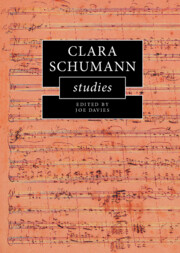Book contents
- Clara Schumann Studies
- Cambridge Composer Studies
- Clara Schumann Studies
- Copyright page
- Dedication
- Contents
- Figures
- Tables
- Music Examples
- Contributors
- Acknowledgements
- Introduction: Clara Schumann in the Musicological Imagination
- 1 Clara and Robert Schumann’s Circles in Dresden
- 2 Disillusionment and Patriotism
- 3 Softened, Smudged, Erased
- 4 A Way with Words
- 5 Clara Schumann and the Nineteenth-Century Piano Concerto
- 6 Clara Schumann and Bach
- 7 Formal Innovation and Virtuosity in Clara Schumann’s Piano Trio in G minor, Op. 17
- 8 Contextualizing Clara Schumann’s Romanzen
- 9 The Young Prophetess in Performance
- 10 Clara Schumann’s Compositional and Concertizing Strategies, and Robert Schumann’s Piano Sets
- 11 Clara: Robert’s Posthumous Androgyne
- 12 Clara Schumann, ‘Clara Schumann’ and the American Press
- 13 Clara Schumann’s Legacy As a Teacher
- Select Bibliography
- Index
2 - Disillusionment and Patriotism
Clara and Robert Schumann in the Wake of the 1848–1849 Revolutions
Published online by Cambridge University Press: 25 November 2021
- Clara Schumann Studies
- Cambridge Composer Studies
- Clara Schumann Studies
- Copyright page
- Dedication
- Contents
- Figures
- Tables
- Music Examples
- Contributors
- Acknowledgements
- Introduction: Clara Schumann in the Musicological Imagination
- 1 Clara and Robert Schumann’s Circles in Dresden
- 2 Disillusionment and Patriotism
- 3 Softened, Smudged, Erased
- 4 A Way with Words
- 5 Clara Schumann and the Nineteenth-Century Piano Concerto
- 6 Clara Schumann and Bach
- 7 Formal Innovation and Virtuosity in Clara Schumann’s Piano Trio in G minor, Op. 17
- 8 Contextualizing Clara Schumann’s Romanzen
- 9 The Young Prophetess in Performance
- 10 Clara Schumann’s Compositional and Concertizing Strategies, and Robert Schumann’s Piano Sets
- 11 Clara: Robert’s Posthumous Androgyne
- 12 Clara Schumann, ‘Clara Schumann’ and the American Press
- 13 Clara Schumann’s Legacy As a Teacher
- Select Bibliography
- Index
Summary
In June 1853, Clara Schumann set to music six inset-poems from the novella Jucunde, hot off the press earlier that year, by the minor poet Hermann Rollett. Schumann and Rollett actually met in Vienna in July 1856, shortly after her husband’s death, and she gave him a presentation copy of her Op. 23 songs. The young Rollett was a political firebrand; he wrote differently after the revolution ended in failure, but he included some of his earlier poems in Jucunde, and covert hints of continued adherence to former doomed ideals are still apparent. So too with Robert and Clara Schumann: both harboured republican sympathies, and both would signal their disillusionment and unchanged political views in several of their songs from the 1850s. If these works seem harmless at first hearing, semi-hidden hints of underlying politics emerge on closer examination. From Robert Schumann’s ‘Des Sennen Abschied’, Op. 79 No. 22; ‘Heimliches Verschwinden’, Op. 89 No. 2; and ‘Warnung’, Op. 119 No. 2, we arrive at Clara Schumann’s ‘Geheimes Flüstern’, Op. 23 No. 3, whose harmonic, tonal and motivic elements hint to the cognoscenti of sadness over political failure and of unconquerable hope for the future.
- Type
- Chapter
- Information
- Clara Schumann Studies , pp. 32 - 56Publisher: Cambridge University PressPrint publication year: 2021

